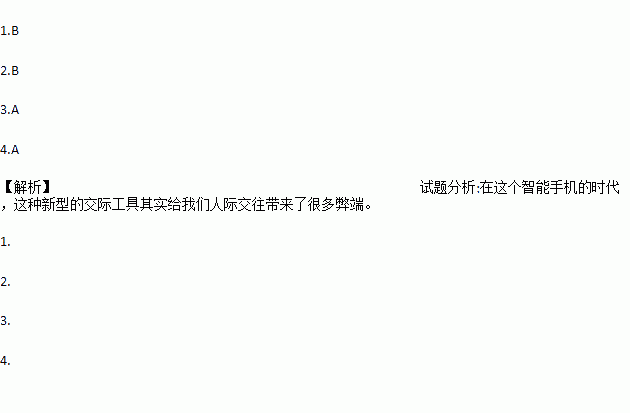题目内容
Some people are so rude!
Who sends an e-mail or a text message that just says “Thank you”? Who leaves a voice mail message rather than texts you? Who asks for a fact easily found on Google? Don’t these people realize that they’re wasting your time?
Maybe I’m the rude one for not appreciating life’s little politeness. But many social agreed standards just don’t make sense to people drowning in digital communication.
In texts, you don’t have to declare who you are or even say hello; E-mail, too, is slower than a text; Voice mail is a now impolite way of trying to connect.
My father learned this lesson after leaving me a dozen voice mail messages, none of which I listened to. Exasperated, he called my sister to express his dissatisfaction that I never returned his phone calls. “Why are you leaving him voice mails?” my sister asked. “Just text him.”
In the age of the smartphone, there is no reason to ask once-acceptable questions about: the weather forecast, a business’s phone number, or directions to a house, a restaurant, which can be easily found on Google Maps. But people still ask these things. And when you answer, they respond with a thank-you e-mail.
How to handle these differing standards? Easy: Consider your audience. Some people, especially older ones, appreciate a thank-you message. Others, like me, want no reply.
The anthropologist (人类学家) Margaret Mead once said that in traditional societies, the young learn from the old. But in modem societies, the old can also learn from the young. Here’s hoping that politeness never goes out of fashion but that time-wasting forms of communication do.
1.What does the underlined word “exasperated” mean in the fifth paragraph?
A. Worried. B. Annoyed.
C. Surprised. D. Tired.
2.Why didn’t the writer reply to his father?
A. He didn’t want to talk with his father.
B. He liked text messages better.
C. He didn’t receive any voice mail messages.
D. He enjoyed checking his voice mails.
3.Which of the following does the writer agree to?
A. Dealing with voice mail should vary with each individual.
B. Declaring who they are or saying hello in texts is necessary
C. People needn’t learn from one another in traditional societies.
D. People needn’t turn to Google for help when in trouble.
4.What’s the best title of this passage?
A. Nowadays: what means should we use in communication
B. Nowadays: do you like leaving others a voice message
C. Nowadays: what should we do with text messages
D. Nowadays: do you need a thank-you message
 状元坊全程突破导练测系列答案
状元坊全程突破导练测系列答案假设你班班主任在安排座位时,让成绩好的学生和成绩差的学生坐在一起。班会上大家就此进行了讨论。请根据下表内容,介绍讨论情况并谈谈自己的看法。
赞成观点 | 反对观点 | 你的观点 |
1.人人都有长处和不足,成绩差的学生也有长处; 2.相互学习,建立友谊。 | 1.部分学习差的学生常常上课说话、违反校规,成绩好的学生可能会受到影响; 2.总是问问题,使成绩好的学生不能专心学习。 | …… |
注意:1.词数150左右;
2.开头已给出,不计入总词数;
3.可适当增加细节,以使行文连贯。
参考词汇:成绩差的学生a slower student 成绩好的学生a top student
We have held a discussion about whether it is good or not for a top student to share a desk with a slower student.
____________________________________________________________________________________________
____________________________________________________________________________________________
____________________________________________________________________________________________
____________________________________________________________________________________________
____________________________________________________________________________________________
____________________________________________________________________________________________
____________________________________________________________________________________________
____________________________________________________________________________________________
____________________________________________________________________

